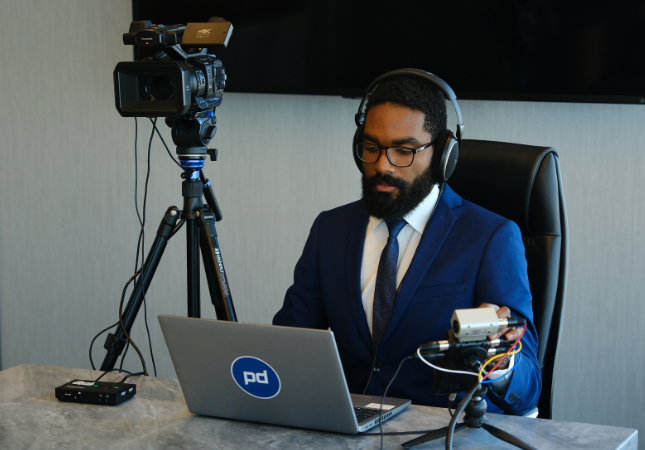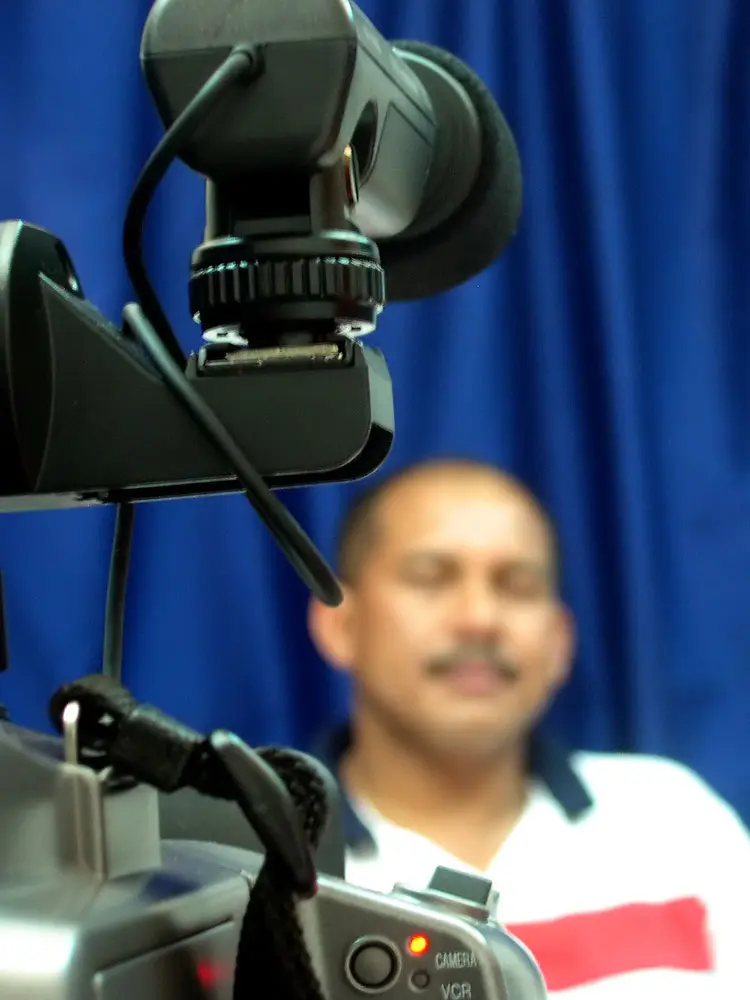The Relevance of Lawful Video Depositions in Modern Legal Solutions: What You Must Know
Lawful video clip depositions have come to be essential in today's legal landscape. They give a multidimensional sight of witness statements that typical records merely can not match. By catching both non-verbal and spoken interaction, these depositions boost the general understanding of a witness's reliability. The efficiency of video depositions pivots on various variables, including compliance with legal requirements and finest methods. Checking out these elements discloses their real value in contemporary lawful solutions
What Are Lawful Video Depositions?
Lawful video clip depositions offer as an important tool in the lawsuits procedure. They entail recording witness testimonies in a video clip layout, catching both non-verbal and spoken interaction. This method enables attorneys to record the temperament, expressions, and responses of witnesses, supplying a richer context for the testimony. Usually conducted in a regulated atmosphere, these depositions are led by attorneys that ask questions while a stenotype reporter documents the discussion. The resulting video clip can be important for trial preparation, as it makes it possible for lawyers to examine the credibility of witnesses and refine their techniques. Furthermore, lawful video clip depositions can be used in numerous lawful contexts, varying from civil disagreements to criminal instances. The aesthetic and auditory components of video clip depositions improve the discussion of proof, making it a necessary component in the modern legal landscape. On the whole, they contribute significantly to the performance and effectiveness of lawful procedures.

Benefits of Video Clip Depositions Over Standard Approaches
Video clip depositions supply numerous advantages contrasted to traditional techniques of taking witness statements. One significant advantage is the capability to record both audio and aesthetic aspects, offering a much more comprehensive record of the witness's statements. This twin layout enhances clarity and allows lawful specialists to reference details nuances throughout trial prep work. Furthermore, video clip depositions facilitate remote engagement, making it easier for witnesses who might be unavailable for in-person appearances as a result of geographical constraints or wellness issues.Moreover, video clip depositions can quicken the general deposition procedure, reducing the moment and expenses linked with traveling and logistics. They likewise boost availability, as taped depositions can be quickly shared among lawful groups and referenced any time. This ease contributes to better instance administration and prep work. In general, video depositions stand for a modern, reliable technique to collecting witness testaments, aligning with the developing demands of the lawful profession.
The Function of Body Movement and Tone in Testimonies

In lawful video depositions, body language and tone play essential roles in communicating a witness's reliability and dependability. Nonverbal cues can give insights into a witness's mood, influencing how their testimony is regarded. Comprehending the impact of these components is crucial for lawyers and jurors alike when examining the reliability of a statement.
Nonverbal Interaction Insights
While spoken interaction is usually highlighted in lawful testaments, nonverbal hints such as body movement and tone play a crucial function in sharing reputation and emotion. Viewers of depositions might keep in mind that a witness's position, gestures, and faces can substantially influence perceptions of integrity. For instance, consistent eye call might signal self-confidence, while preventing look might suggest dishonesty or pain. Likewise, the tone of voice-- its pitch, rate, and volume-- can present sensations of genuineness or uncertainty. Lawyers must be in harmony with these nonverbal signals, as they usually supply important context that complements spoken words. Recognizing these nuances can enhance the effectiveness of depositions and affect the result of legal procedures.
Psychological Tone Effect
The psychological tone communicated throughout legal statements significantly influences just how a witness is perceived. Body movement, vocal inflections, and facial expressions play important functions in shaping the narrative of a testament. A witness exhibiting confidence via steady eye get in touch with and a calm tone can instill a feeling of dependability and involvement. Alternatively, indications of stress and anxiety, such as fidgeting or a shaky voice, might bring about hesitation concerning their account. The subtleties of emotional expression can affect the analysis of facts, making it essential for attorneys to acknowledge these signs. In video clip depositions, the visual and auditory parts integrate, highlighting the importance of emotional tone in sharing genuineness and truthfulness within the lawful procedure.
Reputation and Dependability
An essential variable in developing reputation and reliability throughout testimonies hinges on the witness's body movement and tone of voice. Observers frequently depend on non-verbal hints-- such as eye call, position, and motions-- to assess a witness's genuineness. A witness that maintains eye get in touch with and presents open body language may be regarded as more trusted and from this source truthful than one who prevents eye contact or appears shut off. Furthermore, intonation plays an essential duty; a steady, calm tone can strengthen the credibility of the testimony, while changes in pitch or quantity might elevate doubts. Ultimately, the combination of body language and singing tone significantly affects exactly how a witness's statements are gotten and interpreted in a legal context.
Ideal Practices for Performing Video Clip Depositions
Conducting video depositions requires cautious planning and execution to guarantee a clear and reliable presentation of testament. It is essential to choose a quiet, well-lit area to decrease diversions and safe and secure ideal video clip top quality. The devices needs to be checked ahead of time, consisting of cams, microphones, and lights, to stay clear of technical concerns throughout the deposition.Next, celebrations involved must assess the layout and procedures ahead of time, seeing to it that everyone comprehends their functions. The deponent should be briefed on the process, including just how to respond plainly and concisely.Additionally, keeping a specialist disposition throughout the session is essential. This consists of avoiding speaking over one an additional and validating that all concerns are guided properly. It is vital to videotape the deposition in a style that allows for easy playback and review, preserving the stability of the testimony for future usage.
Lawful Factors To Consider and Compliance Issues
How do lawful factors to consider and compliance issues affect the performance of video depositions? Attorneys have to browse an intricate landscape of regulations, ensuring that video depositions stick to jurisdictional policies and requirements. Conformity with laws concerning personal privacy, consent, and tape-recording methods is important. Getting specific authorization from all parties entailed is required to prevent legal repercussions.Additionally, the admissibility of video clip evidence in court can hinge on compliance with procedural demands. Ensuring that the equipment utilized meets technical criteria is also important, as low quality can undermine the deposition's reliability.Moreover, attorneys must know any certain state laws that govern video depositions, as these can vary substantially. Failure to resolve these considerations can not just endanger the stability of the deposition yet also influence the total situation strategy, ultimately influencing the customer's legal end results.
Just How Video Clip Depositions Influence Jury Perception
While video clip depositions can work as powerful devices in lawful proceedings, their impact on jury perception is substantial. The auditory and aesthetic elements of video recordings offer jurors with a much more detailed understanding of go to the website witness temperament, trustworthiness, and emotional responses. This multimedia strategy can enhance the jurors' capacity to examine the reliability of statement compared to standard text-based transcripts.Moreover, video depositions allow jurors to observe body movement, tone of voice, and faces, every one of which can affect their interpretation of the witness's declarations. The presence of a witness on display can humanize them, promoting empathy and additional reading link, which might guide jurors' point of views. On the other hand, a witness who appears undependable or incredibly elusive on video might lead to unfavorable perceptions that influence a jury's choice. Ultimately, the dynamic nature of video clip depositions plays a vital duty fit just how jurors interpret proof and reach their judgments.
The Future of Video Depositions in Legal Technique
As improvements in innovation proceed to reshape the lawful landscape, the future of video depositions is positioned for substantial development. Technologies such as artificial knowledge, digital fact, and improved video conferencing tools are anticipated to improve the deposition process and boost availability. Legal specialists may use AI-driven analytics to analyze witness reputation and situation strength much more effectively.Moreover, the integration of digital fact might permit juries to experience immersive simulations of depositions, giving much deeper context and understanding. In addition, the trend toward remote depositions is likely to linger, supplying higher versatility for attorneys and clients alike.As remote job becomes significantly normalized, video clip depositions will likely end up being common practice, minimizing costs and time constraints connected with traditional methods. On the whole, these technical innovations promise to boost the performance, effectiveness, and availability of video depositions in legal method, ultimately changing exactly how attorneys plan for test.
Frequently Asked Concerns
Exactly How Much Do Legal Video Depositions Typically Cost?

Can Video Clip Depositions Be Made Use Of in Any Kind Of Kind Of Instance?
Video clip depositions can be made use of in various sorts of instances, consisting of civil, criminal, and family law. Their adaptability enables lawyers to existing witness statements properly, adapting to the specific needs of various legal scenarios.
What Equipment Is Required for a Video Clip Deposition?
To perform a video deposition, necessary tools includes a premium cam, microphone, illumination, and a reliable recording gadget. Furthermore, a computer system with editing software application may be essential for post-production and formatting the last video clip.
How much time Does a Typical Video Clip Deposition Last?
A common video deposition lasts in between two to four hours, relying on the intricacy of the instance and the variety of concerns presented. Extensive sessions might occur, however breaks are generally integrated for participant comfort.

Are Video Clip Depositions Admissible in Court?
Video clip depositions are normally acceptable in court, provided they follow lawful criteria and rules of evidence. Their usage enhances clarity and protects witness testimony, aiding in the judicial procedure during hearings and trials. Legal video clip depositions have actually come to be important in today's legal landscape. Additionally, lawful video clip depositions can be used in numerous legal contexts, ranging from civil conflicts to criminal instances. Furthermore, video clip depositions assist in remote engagement, making it easier for witnesses that may be inaccessible for in-person looks due to geographical restrictions or health and wellness issues.Moreover, video clip depositions can speed up the overall deposition procedure, minimizing the time and expenses connected with traveling and logistics. Making certain that the tools made use of meets technological standards is also vital, as poor high quality can threaten the deposition's reliability.Moreover, lawyers should be aware of any kind of details state legislations that govern video clip depositions, as these can vary significantly. In addition, the fad toward remote depositions is likely to linger, providing greater adaptability for attorneys and customers alike.As remote job ends up being progressively normalized, video clip depositions will likely end up being basic practice, decreasing prices and time restraints connected with conventional methods.